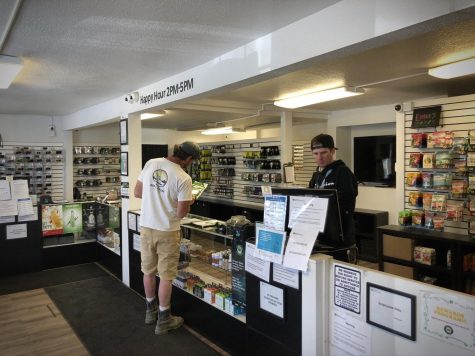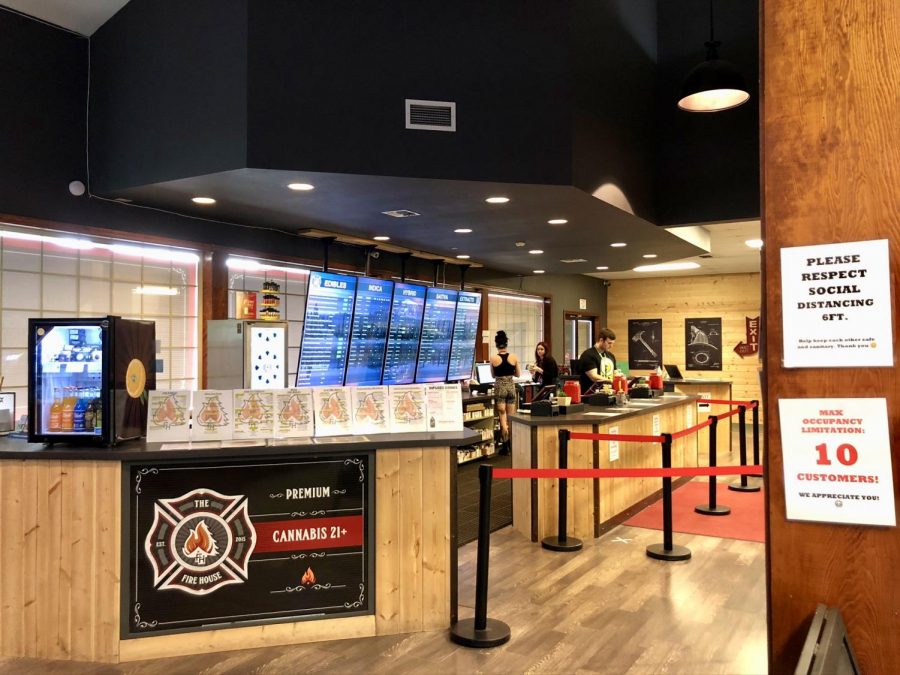No panic at the dispo
May 2, 2020
During the pandemic, many businesses have been forced to close their doors indefinitely. Marijuana dispensaries, however, have not suffered the same fate. According to Washington State’s list of essential businesses, cannabis retailers fall under the category of workers in other medical facilities.
“Everybody’s business is essential for them,” Robert Hendrix, owner of Cannabis Central said. “I feel fortunate to be tagged as an essential business. Very fortunate.”
As business continues for Cannabis Central, special rules and changes have been made to how the store operates.
“We’re cleaning profusely,” Hendrix said. “We have the hand sanitizers, we’ve got the Clorox wipes, we’ve got the disinfectant to clean the floor, we vacuum.”
Aside from cleaning, Cannabis Central has also made some changes to help people follow social distancing guidelines. They use tape markings on the floor and offer curbside pickup for those who feel uncomfortable walking into the store.
“It’s not a problem,” Hendrix said. “We love our customers and especially the elderly who might need a little extra attention through this.”
Although social distancing has caused people to leave their homes less and less, Hendrix said Cannabis Central’s April earnings were looking to be better than they were at the same time last year.
“We’ve had some bigger days than normal because there have been scares that the state was going to shut us down like they did so many businesses,” Hendrix said. “People were stocking up in anticipation maybe of us being shuttered.”
While the store has been doing well, Hendrix said more labor-intensive vendors and suppliers have been having a tougher time.

“We’ve tried to be flexible with the vendors as far as deliveries,” Hendrix said. “They might be a little more short handed so delivery people might be a little more scarce, and we may have to wait an extra day or two or three.”
Another dispensary in Ellensburg, The Fire House, has had a similar experience with changes to its operations and business since the stay-at-home order.
“We’ve adapted,” Fire House Manager Nikki Baker said. “Rather than it putting stress on us, we’ve just made it work so we can remain open by installing all of these precautions and abiding by the CDC guidelines.”
The Fire House has made similar changes to their day-to-day operations as Cannabis Central, including revamped cleaning strategies, tape indicators on the floor and the introduction of curbside pickup. In addition, the store has installed a rope barrier around the front registers to keep customers from physically contacting the counters.
“We’ve limited our maximum number of people in the store to 10,” Baker said. “We’re keeping a constant headcount.”
Although they’ve had to implement a fair amount of safety precautions in the store, Baker said the changes haven’t made their jobs too much harder.
“Everybody has kept a really positive attitude,” Baker said. “I think we’re all in the same mindset that we’re very grateful to be employed. The people who are here have been continuing to work just as hard trying to keep it clean but also present the idea that this is still a safe place, this is still the same place that it was before.”
Baker said it feels like the store is doing the right thing by remaining open.
“The way that people open up to us and explain how grateful they are to be able to come here and to get the things that are helping them through whatever it may be,” Baker said. “I think if we were to shut down, it would be really hard for them.”
Emily Russell, a budtender at The Fire House, said smoking marijuana changed her life and helped her through struggles of her own.
“I have multiple sclerosis,” Russell said. “Without [marijuana], I’d be struggling more than I am with it.”
Even though Russell’s diagnosis means she’s immunocompromised, she said she’s still comfortable coming into work.
“We’ve all been super careful,” Russell said. “I feel totally safe coming to work, which is cool.”
Although marijuana isn’t always used for medicinal purposes, Hendrix believes that even people who are technically using the drug recreationally are probably trying to deal with some issues of their own.
“Even recreational customers, they’re not using necessarily recreationally,” Hendrix said. “They’re trying to deal with something…we’ve heard more conversations about anxiety in the last month or so.”
Hendrix said he believes roughly half to two thirds of the customers who come into his store would likely consider dispensaries to be essential.
“If you [asked] them, they would say, ‘yeah, it’s pretty darn important to me and my life these days,’” Hendrix said.


